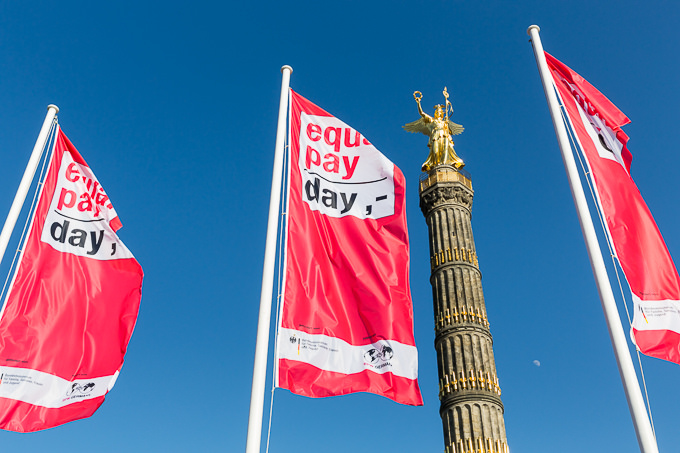Global Leaders Mark Equal Pay Day 2025 With Renewed Push for Pay Equity
The event brought together governments, employers, workers’ representatives, UN agencies, civil society organizations, and academia to exchange views on challenges and opportunities in advancing pay equity.

The Equal Pay International Coalition (EPIC) — co-led by the International Labour Organization (ILO), the Organisation for Economic Co-operation and Development (OECD), and UN Women — marked International Equal Pay Day 2025 with a high-level debate in New York, urging stronger, practical action to close the persistent gender pay gap.
The event brought together governments, employers, workers’ representatives, UN agencies, civil society organizations, and academia to exchange views on challenges and opportunities in advancing pay equity.
Equal Pay as a Fundamental Right
Opening the debate, Cynthia Samuel-Olonjuwon, ILO Special Representative to the UN, reminded participants that equal pay for work of equal value is not a policy choice but a fundamental principle of the ILO Constitution, anchored in ILO Convention No. 100.
Despite decades of advocacy, she noted, the gender pay gap remains stubbornly persistent worldwide. While women now make up a growing share of the workforce, structural inequalities, occupational segregation, and undervaluation of women’s work continue to drive disparities.
Samuel-Olonjuwon also highlighted new challenges linked to digitalization and artificial intelligence (AI):
“Our shared task is to seize the opportunities and govern the risks so that technology serves pay equity rather than undermines it,” she cautioned.
Momentum From Brazil’s G20 Presidency
In keynote remarks, Maíra Lacerda, EPIC Chair from Brazil, pointed to the Coalition’s growth — now over 70 members worldwide — and its integration into the ILO’s Global Coalition for Social Justice.
She highlighted Brazil’s G20 presidency, under which governments were urged to prioritize equal pay policies and join EPIC, helping to anchor pay equity on the global economic agenda.
“The Coalition grows stronger with every new member,” she said, stressing the need for broader engagement across regions and sectors.
Debate: Employer and Worker Perspectives
The event featured a dynamic debate moderated by Bathylle Missika of the OECD Development Centre, with perspectives from both employer and worker representatives.
-
Shea Gopaul (International Organization of Employers) emphasized the importance of fostering inclusive business models, while balancing competitiveness and sustainability.
-
Paola Simonetti (International Trade Union Confederation) underlined the urgency of closing wage gaps, tackling unpaid care burdens, and strengthening labour protections to ensure equity in the future of work.
Additional contributions came from:
-
Sara Falcão Casaca (ISEG Lisbon), who highlighted research on structural inequalities.
-
Lara Tameme (Jordan’s Ministry of Labour), who shared national policy innovations.
-
Rakesh Patry (Canada), outlining Canada’s pay equity legislation and monitoring tools.
-
Vidir Ragnarsson (PayAnalytics), presenting digital solutions for wage transparency.
-
David Joyce (ICTU), who focused on trade union strategies to negotiate fair pay.
UN Resolution and Global Advocacy
The discussion recalled that in 2019, the UN General Assembly proclaimed 18 September as International Equal Pay Day, urging governments and social partners to work together to eliminate pay discrimination. Since then, the day has served as a platform to call attention to wage inequality and mobilize action.
Closing: Aligning Policy, Dialogue, and Technology
Closing the debate, Seemin Qayum of UN Women stressed that bridging the gender pay gap is essential to achieving women’s economic empowerment and advancing the Sustainable Development Goals (SDGs).
“Progress is possible when policy, social dialogue, and technology align,” she said, urging continued cooperation to ensure that the future of work is one of fairness and equality.
The Broader Context
Globally, women earn on average 20% less than men, with disparities even greater in some regions and among women in marginalized groups. The pay gap is influenced by multiple factors, including occupational segregation, undervaluation of care work, limited access to leadership roles, and systemic bias.
Initiatives like EPIC aim to accelerate solutions through coordinated action — combining policy reforms, wage transparency measures, collective bargaining, and innovative technology to dismantle barriers.
As the debate in New York demonstrated, the fight for equal pay is far from over. But with renewed political momentum, stronger coalitions, and technological tools, advocates believe the global community can move closer to closing the gender pay gap once and for all.










